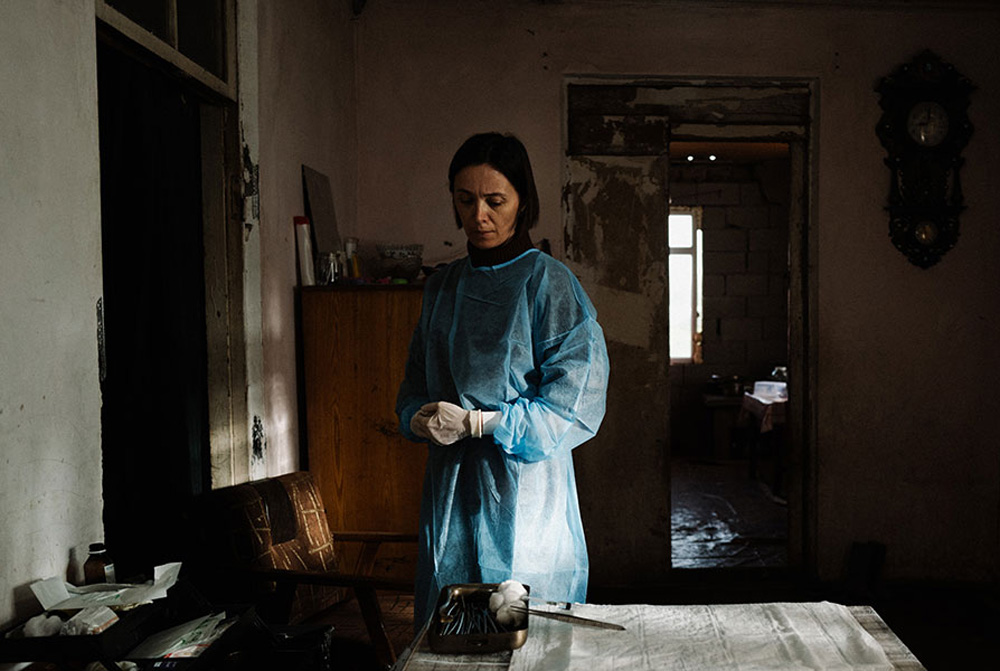One could see the mud that Nina (Ia Sukhitashvili) has to drive through in the rural reaches of Georgia as a metaphor in “April,” but there really is something in the sediment that isn’t necessarily tactile, but organic to the region that is as much a part of the environment as anything else. Such an appreciation for the power of nature could be seen in director Dea Kulumbegashvili’s mesmerizing debut feature “Beginning,” where the moment of lying down if a field could result in a profound sense of peace for its heroine (also played by Sukhitashvili) and was given a full five minutes for its effects to set in with little occurring besides the whistle of the wind, and in the filmmaker’s possibly even more remarkable second feature, the murky soil comes to represent many things, but the fact that it’s difficult to trudge through has a direct effect all on its own when reflecting how nobody has or will bother to improve conditions and a hard way of life has only toughened residents to not be able to imagine anything else.
Ironically, Kulumbegashvili has already distinguished herself to be at the vanguard of contemporary filmmakers in terms of how to look at the world, crafting a style in which the edges of what can be seen are severe and more often than not, you’re placed in the position of the film’s protagonist. In this case, that’s Nina, an obstetrician who holds an untenable position in the community helping couples give birth at a local clinic and performing abortions on call in areas where pregnancies are unaffordable for a variety of reasons and often unwanted because of how they came about.
Nina can’t feel good about what she does, but realizes only she has the skills and the temperament to perform the procedure properly, though her confidence is rattled by an investigation at her official job, prompted by the death of an infant shortly after leaving its mother’s womb. Her superiors recognize her value, particularly in a largely male-dominated space at the hospital, but the case is pushed forward by a grieving father, whose mother insisted on a natural birth when early warnings suggested a C-section might be more appropriate, and while Nina endures criticism for how she handled the situation, she has to be careful what she says when also is burdened by the knowledge of her outside work, currently involving a horrific case of a deaf mute teen she’s been asked to relieve of her pregnancy.
Not long after “April” begins, the scene of the birth at the clinic is shown in graphic detail, but somehow it’s the scene after that ends up feeling more explicit when you adjust to Nina’s gaze as the father of the infant and her two male colleagues conduct a post-mortem. You only gradually catch up with what’s going on as they talk, but the weight of the room becomes acutely unbearable when by taking her perspective, she isn’t seen in it. It’s one abstraction of many that becomes a way of eliciting an uncommon emotional precision when the mostly miserable Nina provides care for those who feel the loneliest in the world, but has no one looking out for her, leading Kulumbegashvili to introduce what looks to be a desiccated corpse to wander around the community in parallel with Nina as the nurse receives little to no sympathy from people who should have compassion, from her colleague David (Kakha Kintsurashvili), whom she once considered an engagement with, to Mzia (Ana Nikolava), the mother of the teen whose family has long trusted her with their health needs.
In lesser hands, the gambit might only come across as inexcusably odd, but it’s both appropriately unsettling and specific to the disassociation that Nina experiences when the work requires her to remove any of her own feelings from it. Sukhitashvili is magnetic as Nina, but her absence from the frame for long stretches gives the moments when she is on screen an even greater gravitational pull and for Kulumbegashvili, the strong performance is just one of many ways to access the character when the intricate sound design and carefully framed compositions ground you so firmly in her experience. Nina may be mired in procedures and tradition that go back generations and could be rotten at their core, but “April” is exhilarating when Kulumbegashvili is unconstrained by history, creating her own unique cinematic language to speak so intimately to a tragedy on both an individual and societal scale in an entirely fresh way.
“April” does not yet have U.S. distribution. It will next play at the New York Film Festival at Alice Tully Hall on October 7th at 9 pm, October 8th at 6 pm and October 9th at noon.




